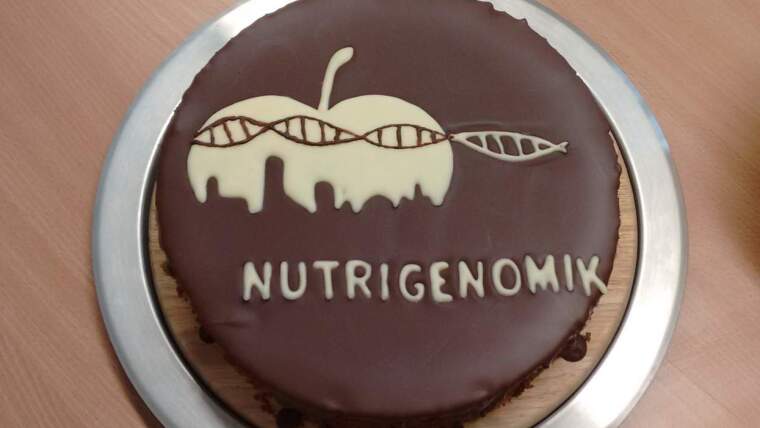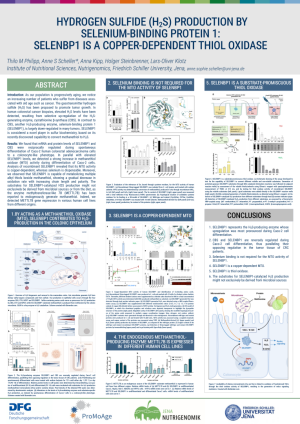
Poster Anne Scheller - Aging Meeting Halle 2023
Grafik: Anne Scheller11th International Meeting on Ageing: "Modifying Cardiovascular Ageing: from old cells to elderly patients”
HYDROGEN SULFIDE (H2S) PRODUCTION BY SELENIUM-BINDING PROTEIN 1:
SELENBP1 IS A COPPER-DEPENDENT THIOL OXIDASE
TM Philipp, AS Scheller, A Kipp, H Steinbrenner, LO Klotz
Institute of Nutritional Sciences, Nutrigenomics, Friedrich Schiller University, Jena
Abstract
Introduction: As our population is progressively aging, we notice an increasing number of patients who suffer from diseases asso-ciated with old age such as cancer. The gasotransmitter hydrogen sulfide (H2S) has been proposed to promote tumor growth. In human colorectal cancer biopsies, elevated H2S levels have been detected, resulting from selective up-regulation of the H2S-generating enzyme, cystathionine β-synthase (CBS). In contrast to CBS, another H2S-producing enzyme, selenium-binding protein 1 (SELENBP1), is largely down-regulated in many tumors. SELENBP1 is considered a novel player in sulfur biochemistry, based on its recently discovered capability to convert methanethiol to H2S.
Results: We found that mRNA and protein levels of SELENBP1 and CBS were reciprocally regulated during spontaneous differentiation of Caco-2 human colorectal adenocarcinoma cells to a colonocyte-like phenotype. In parallel with elevated SELENBP1 levels, we detected a strong increase in methanethiol oxidase (MTO) activity during differentiation of Caco-2 cells. Analysis of recombinant SELENBP1 revealed that its MTO activity is copper-dependent, whereas selenium is dispensable. Moreover, we observed that SELENBP1 is capable of metabolizing multiple alkyl thiols beside methanethiol, showing a gradual decrease in oxidation rate with increasing chain length and polarity. The substrates for SELENBP1-catalyzed H2S production might not exclusively be derived from microbial sources or from the diet, as the enzyme methyltransferase-like 7B (METTL7B) has been reported to endogenously generate methanethiol. Indeed, we detected METTL7B gene expression in various human cell lines from different origins.
